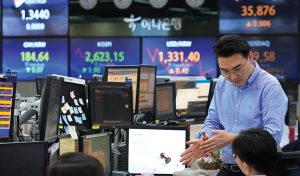TOKYO / WAM
US Treasury yields pushed to a near four-week peak on Wednesday, lifting their Asia-Pacific counterparts and the dollar while pressuring equities, as data sowed new doubts about the timing and extent of Federal Reserve rate cuts, Reuters reported. Crude oil rose for a fourth day to reach a four-week high. Benchmark US 10-year yields ticked up as high as 4.568 percent in Tokyo trading hours, a level not seen since May 3, following poorly received two- and five-year Treasury auctions overnight. Equivalent Japanese yields hit the highest since December 2011 at 1.07 percent, while Australian yields jumped to a more than three-week top of 4.428 percent. Investors were also caught off-guard by a sharp improvement in a US consumer confidence measure for May. Economists had predicted a fourth straight month of weaker confidence, particularly after a tepid reading for the University of Michigan’s analogous survey result from May 24.
That has kept the market guessing about the strength of the economy and sticky inflationary pressures, which in turn cloud the outlook for the Fed’s policy path.
Traders currently put the odds of at least a quarter-point interest rate cut by September at 44 percent following the data, from a coin toss a day earlier, according to the CME Group’s FedWatch Tool. The dollar rose to a four-week peak of 157.41 yen, while gaining about 0.1 percent against both the euro and sterling. Australia’s dollar slipped slightly to US$0.6646, giving up gains from earlier in the day following an unexpected jump in local consumer inflation last month.
“Whether incoming US. economic news sees the money market pendulum swing back in favour of lower US rates in Q3” will be key to whether the Aussie can top this month’s four-month peak of US$0.6714, National Australia Bank strategists wrote in a client note. “Our base line view is ‘yes it will’ – we still have September for a first Fed easing, then another by
year-end.” Regional stock markets were lower, with the notable exception of mainland China. Japan’s Nikkei slipped 0.8 percent, Australia’s benchmark dropped 1.2 percent, while Hong Kong’s Hang Seng slid 1.8 percent.
However, mainland blue chips edged 0.1 percent higher after the IMF upgraded its economic growth forecasts for China. MSCI’s broadest index of Asia-Pacific shares dropped 1.4 percent.
US S&P 500 futures pointed 0.4 percent lower following a flat finish on May 28 for the cash index. UK FTSE futures shed 0.5 percent and German DAX futures lost 0.3
percent. In energy markets, Brent crude futures for July delivery rose 18 cents, or 0.21 percent, to $84.40 a barrel. US West Texas Intermediate futures for July climbed 29 cents, or 0.36 percent, to $80.12.
 The Gulf Time Newspaper One of the finest business newspapers in the UAE brought to you by our professional writers and editors.
The Gulf Time Newspaper One of the finest business newspapers in the UAE brought to you by our professional writers and editors.
